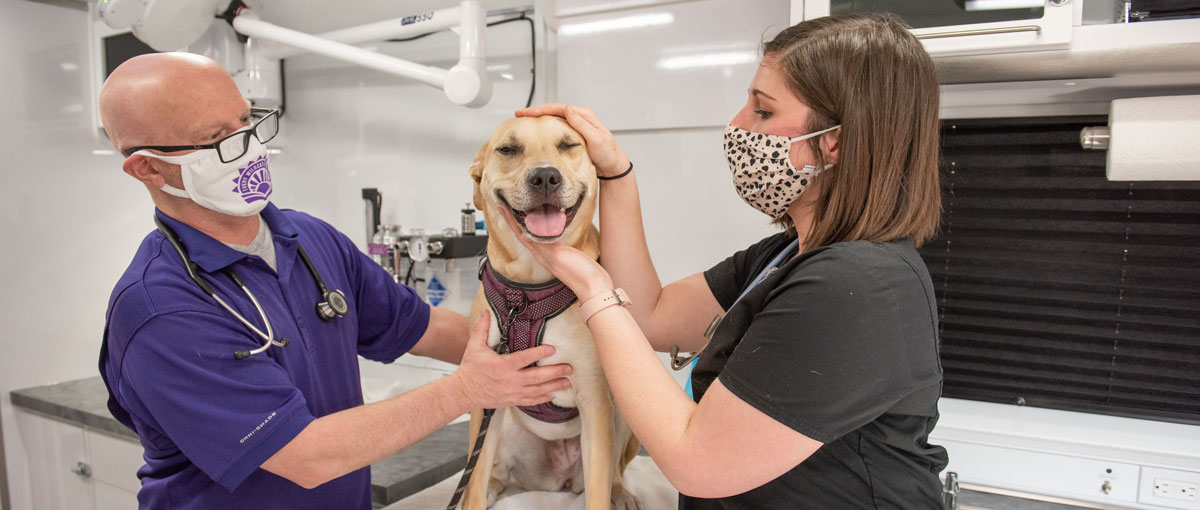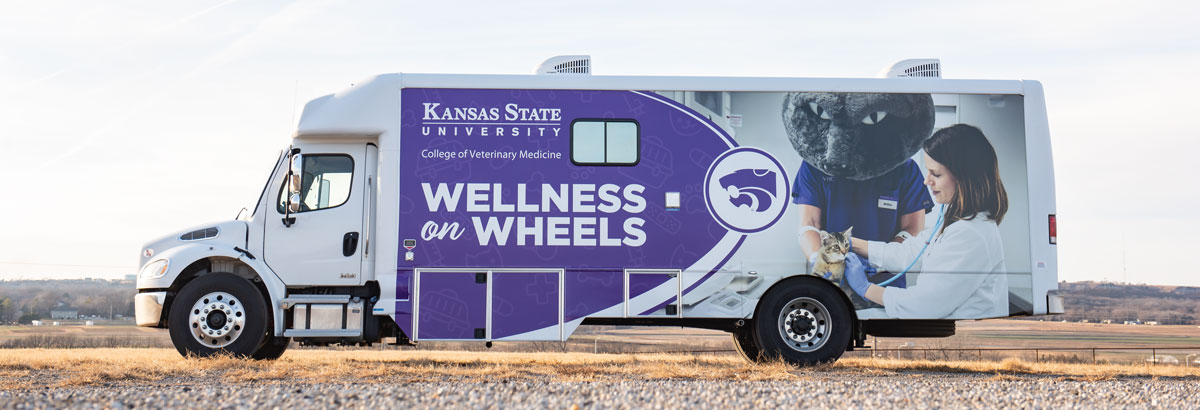Wildcats on wheels
College of Veterinary Medicine program helps communities while educating students
By Taylor Provine

Brad Crauer, left, clinical associate professor and director of the shelter medicine program, works with student Hayley Barkoviak on the Shelter Medicine Mobile Surgery Unit.
Kansas State University veterinary students are hitting the road for the sixth year on the Shelter Medicine Mobile Surgery Unit. Their mission: “Future Vets Helping Future Pets.”
The College of Veterinary Medicine shelter medicine program is the foundation for the Mobile Surgery Unit, which was developed in 2015 by Brad Crauer, clinical associate professor and director of the program. Shelter medicine is a veterinary medicine specialty that provides care to homeless animals in shelters or other animal welfare organizations.
The purpose of the Mobile Surgery Unit is to educate students while also providing community outreach and service — both key K-State focuses as a land-grant university. Fourth-year students go on two-week rotations to organizations, such as animal shelters, and provide free spay/neuter procedures and medical triage.
“All of our shelter partners have limited resources, so it’s a win-win situation in that the organizations are getting free services and they are able to reallocate resources,” Crauer said. “Often they’ll improve their facilities, increase training, buy supplies or provide higher-level veterinary care such as heartworm treatment or amputations.”
The Mobile Surgery Unit is a 32-foot mobile trailer that includes two surgery tables and a prep table. Each rotation team includes Crauer or colleague Cody Dressler, clinical assistant professor, three fourth-year veterinary students and a veterinary nurse. Most of the program’s shelter partners are within a two-hour drive across central Kansas and Nebraska, which allows the team to travel, perform several surgeries and return home each day. The students average 50 surgeries in a two-week rotation and the shelter medicine program recently performed its 27,000th spay/neuter procedure.
Fourth-year veterinary student Hayley Barkoviak said she has benefited from the opportunities to gain surgical experience and give back to the community.
“I have received hands-on experience doing surgeries and physical exams and gained exposure to the medical problems in shelters,” she said. “I’ve also learned about how a shelter is important to a community and as a shelter veterinarian what you have to offer that’s more than just spays and neuters. It feels good to be helping homeless animals.”
According to Crauer, shelter medicine is one of the newest veterinary specialties and provides opportunities to collect data and improve practices.
“As veterinarians, we are dipping into the animal welfare realm, and there’s a wealth of research opportunities that are available to us,” he said. “We have access to populations coming through animal shelters that allow us to generate data. We have the option to pull blood from dogs on a regular basis from all over the state to see the incidence of disease and change sanitation techniques and design to see what’s most effective from a disease prevention standpoint.”
While the Mobile Surgery Unit is for fourth-year students, the program has expanded to include shelter medicine and disaster response elective classes for first- and second-year students. Crauer said that a partnership with the T. Russell Reitz Animal Shelter in Manhattan is engaging undergraduate students as well.
“We oversee the medicine and surgery at T. Russell Reitz Animal Shelter, which allows us to bring first-, second- and third-year students into that setting to help with surgery and medical exams,” he said.
The shelter medicine program is primarily funded by grant support, private donations and the Kansas pet friendly license plate program.
Next stop: Going beyond the shelter

The new Wellness on Wheels vehicle allows students and faculty to address animal welfare and provide medical care beyond the shelter setting.
The College of Veterinary Medicine is adding to its fleet of mobile services in spring 2021 with the rollout of the Wellness on Wheels vehicle. The program allows students and faculty to address animal welfare and provide medical care beyond the shelter setting in populations where it is needed.
“When we look nationwide there’s a population of animals and a population of people who don’t have access to medical care,” Crauer said. “From a pet care perspective, owners either can’t afford it, they don’t have physical access because there’s not a veterinarian near, or they just don’t know what they should be doing from a wellness and general medicine standpoint.”
In addition to hosting wellness clinics at various locations, the program is partnering with area homeless missions and health care providers to help this population and their pets get care.
“We are addressing it as a One Health approach and looking at how we can engage these populations and help their pets and also help them get out of the situation they’re in,” Crauer said.
The mobile Wellness on Wheels clinic has a treatment table, surgery table, waiting and holding areas and kennels. It also has basic lab, X-ray and dentistry capabilities. The new vehicle also can be deployed for disaster response in situations such as tornadoes, flooding or fire to provide medical care, transportation or evacuations for animals.
By the numbers
Shelter Medicine Mobile Surgery Unit
- 27K+ The number of spay/neuter surgeries the unit has performed.
- 90 The number of veterinary student who participate on the rotation annually.
- 50 The average number of surgeries the veterinary students perform in a two-week rotation.
- 20+ The number of shelter partners.